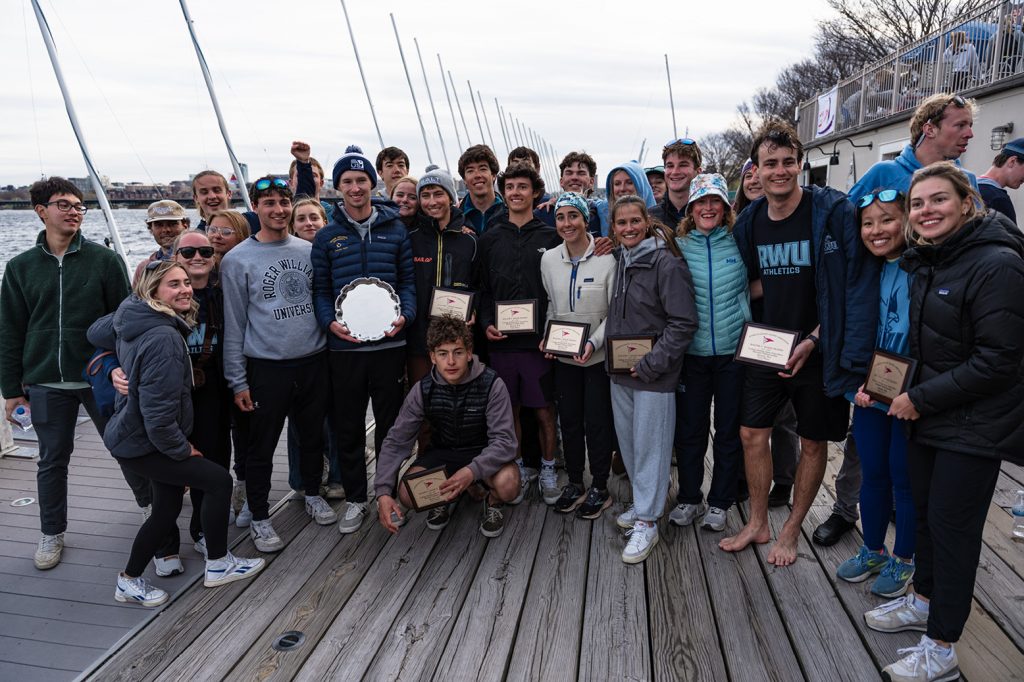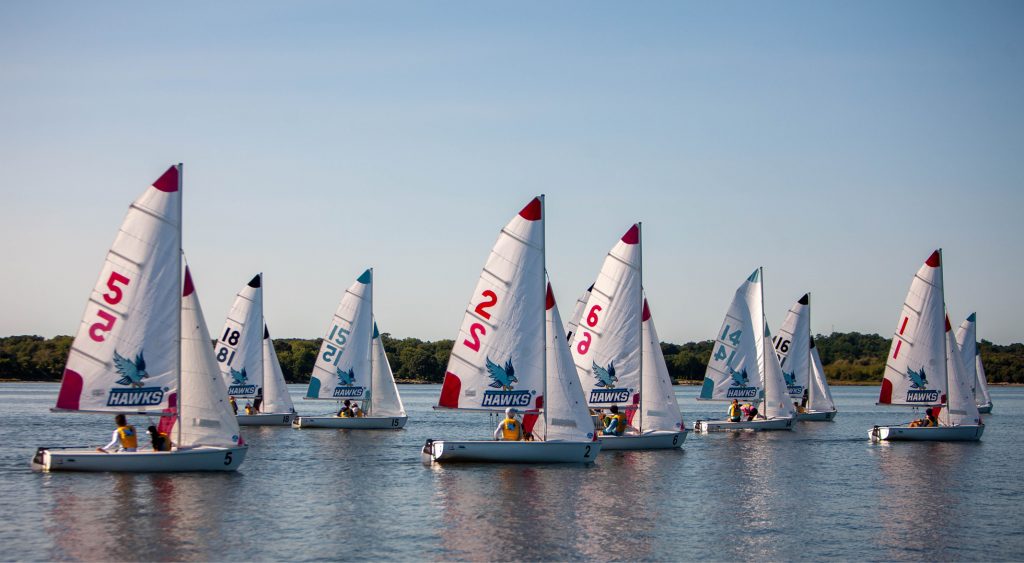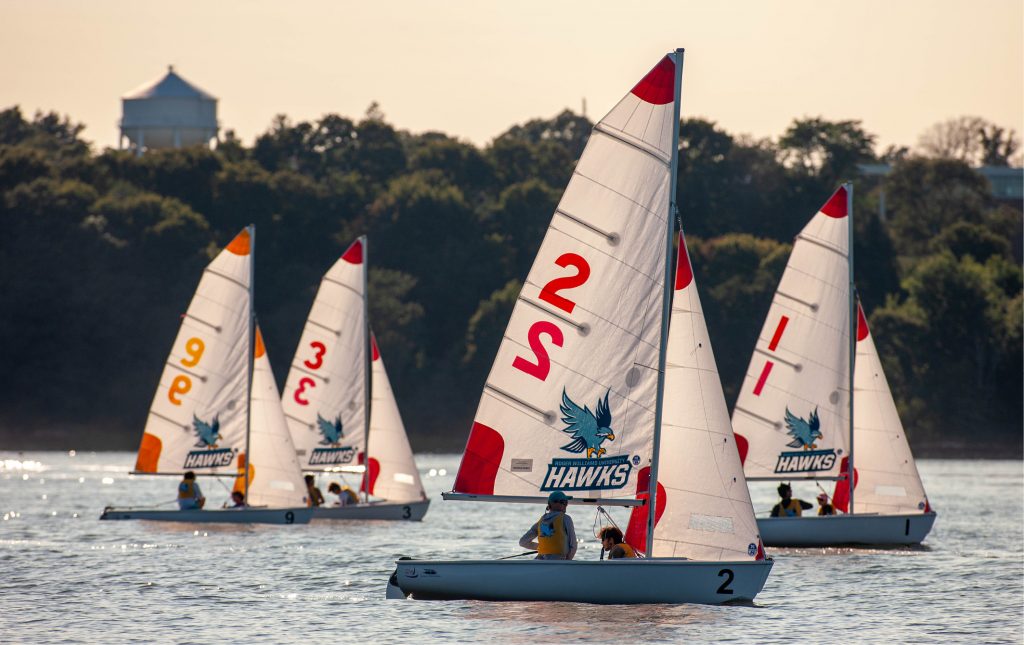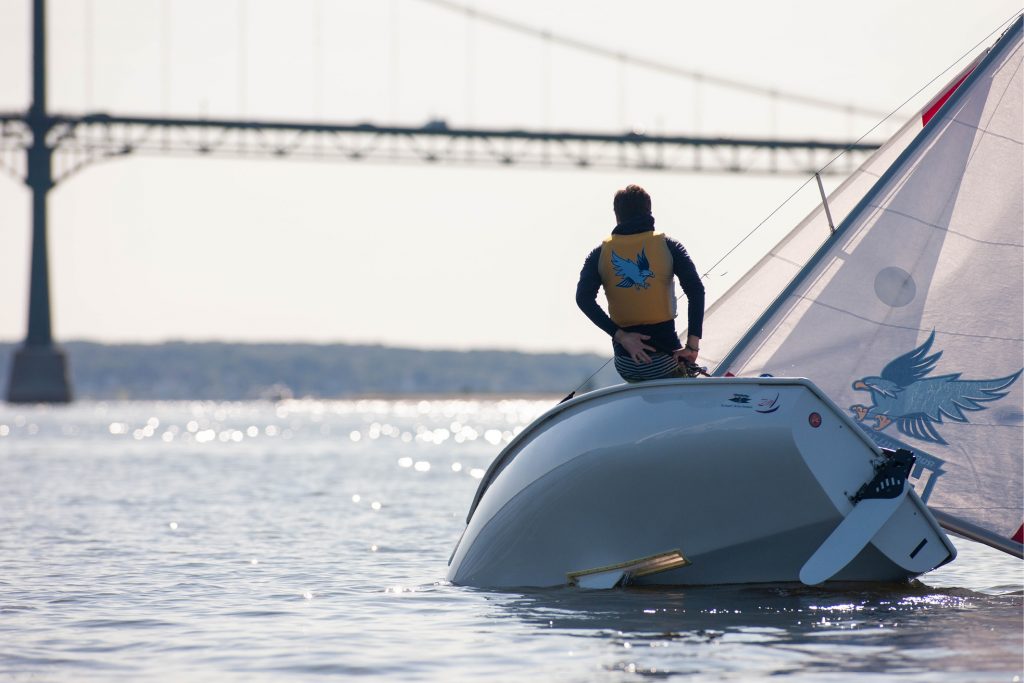How an underdog team became a national sailing powerhouse
By Jill Pais and Mel Thibeault

Everyone on the Roger Williams University Sailing team roster turned out to cheer the Open Team Race members on to victory in the 2024 ICSA Open Team Race National Championship. © Dave Curtis/DHFA Photography
In a spectacular showcase of skill, strategy and determination, the Sailing team at Roger Williams University (RWU) in Bristol, RI, clinched the 2024 Inter-Collegiate Sailing Association (ICSA) Open Team Race National Championship, hosted by the Massachusetts Institute of Technology and Harvard University on April 25-27. This victory, achieved over three intense days of competition on the Charles River, marks RWU’s second national title and places the university among institutions with the most ICSA national championships in history.
For the first time in fourteen years, a smaller institution has bested the well-funded, predominantly Ivy League heavyweights. With an impressive 18-4 record, RWU Sailing edged out the competition, with Harvard University coming in second, Yale University in third, and Brown University in fourth place.

Training in Mount Hope Bay’s shifty breezes and vexing currents helped hone the Hawks’ competitive talons. © Matthew Cohen Photography
The championship RWU team included Class of 2024 graduate Aidan Hoogland of Chula Vista, CA, rising junior Carlos Bermudez de Castro of La Coruña, Spain, and rising junior Kyle Pfrang of Suffolk, VA as skippers, alongside crew members Class of 2024 graduate Michaela O’Donnell of Elyria, OH, and rising seniors and team co-captains Carly Kiss of Pewaukee, WI and Claire Buckley of Bridgewater, CT.
“Our team has worked incredibly hard all year, and everything came together for us at the most important time,” said RWU Sailing Head Coach Amanda Callahan. “Our entire roster supported their races against three top programs – all Ivies – during the final rounds, and you could hear their cheers and bells up and down the Charles.”
The RWU Sailing team’s win underscores a triumph of grit and meticulous preparation for an underdog program, but the team’s journey was not without its challenges. After finishing as runner-up in the Open Team Race National Championship in 2018, 2021, and 2022, and a disappointing sixth-place finish in 2023, RWU Sailing was eager to prove its mettle at the 2024 championship competition.
Strategy and Training: The RWU Edge
To come back stronger, the team doubled down on their training regimen and adopted innovative strategies to elevate their performance. Callahan said they made sure to hit the maximum allowed training hours both on and off the water, while cultivating a stronger team culture and communication.
“Team dynamics are crucial in a sport like sailing where split-second decisions can make or break a race,” said Callahan. “We worked on building a stronger team spirit and trust among our sailors, which paid off during the championship.”
RWU’s unique waterfront training facility on the shores of Mount Hope Bay also contributed significantly to their success. From calm to choppy seas, shifty winds from all directions, strong current and a wide range of topography, RWU sailors experience and learn to perform in a broad spectrum of challenges and nearly any conditions, giving them a competitive edge.
“Our team was able to climb to this victory through a year full of hard work, both on and off the water,” said co-captain Buckley, one of the Open Team Race members. “We spent hours together and focused on the idea of psychological safety, inviting experts to talk about how to build a better team where we are supportive and kind to each other and where we are all comfortable pushing each other to perform at the highest level.”
“More than anything our victory was a testament to the power of collaboration, communication and grit,” according to Kiss, fellow team co-captain and Open Team Race champ. “As a team, we dedicated time to cultivating a strong team culture, had tough conversations, and emphasized fitness, which truly paid off. The entire Roger Williams University Sailing team showed up for us during the event, and their support was invaluable. We proved that with hard work and the willingness to sacrifice, you can achieve anything.”

Embracing a more rigorous regimen, RWU Sailing logged the maximum allowed training hours both on and off the water. © Matthew Cohen Photography
A Winning Formula
RWU Sailing’s success wasn’t limited to the Open Team Race Championship. The team also excelled in the 2024 ICSA Open Fleet Race Championship, qualifying first in the semi-finals and finishing 11th overall. Their performance in the 2024 ICSA Women’s Dinghy Championship was equally remarkable, with a dramatic 50-point reversal in the semi-finals that propelled them to the finals.
Director of Athletics, Intramurals, and Recreation Kiki Jacobs celebrated the team’s remarkable achievement. “The team came together and did their best sailing when it counted. It was great to see all of the support from teammates, alumni, and current and former parents in Cambridge. It shows that Roger Williams University can compete at the highest level.”
The RWU Sailing team’s rise from an underdog to a national powerhouse is a compelling narrative of perseverance and innovation. With two coaches who collectively hold ten US Nationals titles, RWU has transformed its sailing program into a formidable contender – with clinching the national title for a second time in school history a testament to their hard work and strategic acumen.

With the Fall Sailing season underway, the Hawks hope to swoop on more national titles. © Matthew Cohen Photograpy
Hard Work on Repeat
With the next collegiate sailing season about to begin, Buckley says RWU Sailing is poised to continue its legacy of excellence.
“Winning Nationals this year was a visual of how our team can show up for one another and compete when we are at the top of our game. Going into this new season will bring new challenges, and embracing those with the same confidence and mindset we had at nationals will be key. We will look to have the same success by repeating what we did well this spring: Give our all at every practice, study the concepts of team racing, work out as a team, and build a team culture that embraces respect, grit, and resilience.”
As RWU Sailing celebrates its historic victory, the message is clear: in the world of competitive sports, passion and perseverance often trump size and financial backing. For Roger Williams University and its sailing team, the 2024 championship is not just a win—it is a defining moment in their storied journey, setting the stage for future triumphs and continuing to inspire the next generation of sailors.
“RWU Sailing is a small but mighty powerhouse in collegiate sailing,” Callahan said. “We’ve built a reputation for developing sailors at an accelerated pace. Our comprehensive training and strategic focus have set us apart from other programs. Students from all over the world come to RWU to join our Sailing team and get an excellent education in the best place in the world for both sailing and higher education.”
Sailing is one of two co-ed sports at RWU, Equestrian being the other. To learn more, visit rwuhawks.com/sports/sailing. ■




